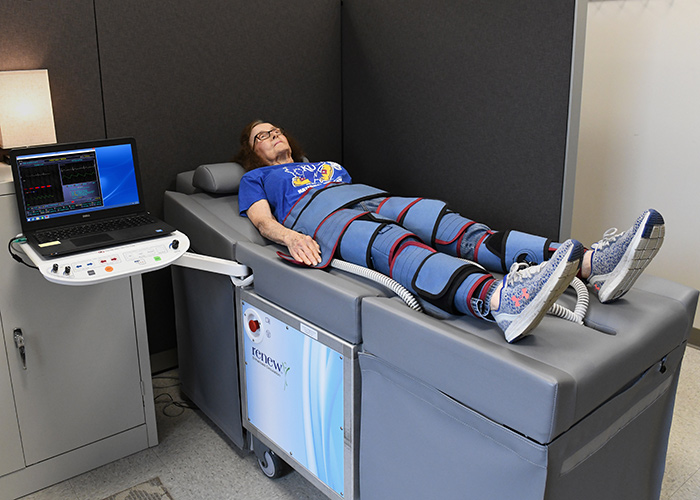Blood
Study shows cognitive benefit of counterpulsation device that increases blood flow to the brain
An outpatient therapy that was approved by the FDA more than 40 years ago to treat chronic angina (chest pain) and heart failure can also improve cognitive function in people with mild cognitive impairment or Alzheimer’s disease, according to research led by the University of Kansas Medical Center.
The brain requires more than its share of blood to function properly: it accounts for 2% of body mass but receives 20% of the blood flow from the heart. That cerebral blood flow decreases as people age, and reduced blood flow to the brain is a known risk factor for dementia and Alzheimer’s disease. Restoring it could improve cognition in people who have these conditions.
The recent research at KU Medical Center explored the effects on the brain of increasing blood flow using a therapy known as external counterpulsation, or ECP. During this treatment, a patient lies on a table with three large inflatable cuffs strapped to their calves, thighs and hips. These cuffs inflate and apply pressure when the heart is at rest and deflate when the heart contracts, which pushes blood flow and thus supplies more oxygen and nutrients throughout the body.
“We showed that blood flow to the brain did increase with this treatment, and when blood flow increased, their cognition improved,” said Patrick M. Moriarty, M.D., professor of medicine at KU Medical Center and principal investigator on the study. “You’re increasing nutrition to tissues that need it.”
Moriarty became interested in improving cognition in patients with dementia a decade ago as a byproduct of his work at the Atherosclerosis/Lipid-apheresis Center at KU Medical Center, which he directs. Lipid-apheresis is a treatment in which a machine filters bad cholesterol, such as LDL, out of the blood of people with exceedingly high levels. The treatment also removes inflammatory proteins, thus reducing blood viscosity (thickness) by 20% to 30%. “I tell my patients, ‘We change the blood from ketchup to tomato juice,’” said Moriarty. Lowering blood viscosity improves microvascular blood flow.
Moriarty had seen the treatment improve not only patients’ cardiovascular health but also their cognition. That got him thinking about the effect of blood flow on the cognition of people who have dementia. The most obvious and common way to increase blood flow is through regular aerobic exercise. But what about people with dementia who are unable to exercise because of aging and physical and mental limitations? he wondered. Moriarty started exploring the idea of using external counterpulsation therapy to improve cognitive function in these patients.
External counterpulsation devices provide much of the benefits of aerobic exercise, including the formation of new blood vessels, without the person moving a muscle. For decades, these devices have improved the cardiovascular health of heart patients as well as elite athletes such as Shaquille O’Neal, Peyton Manning and Tom Brady, who have used them to increase their endurance, Moriarty said.
Moriarty worked with Jeffrey Burns, M.D., co-director of the KU Alzheimer’s Disease Research Center, to conduct a study with a very small group of patients from The University of Kansas Health System. That pilot study showed that blood flow to the brain and cognition did increase with the treatment.
This latest study included 190 participants, average age of 68, with mild cognitive impairment or mild Alzheimer’s disease across 10 study sites in the U.S. Half the study participants received the external counterpulsation treatment (5-6 pounds per square inch or PSI), while the other half received “sham” treatment, which meant that their device was set at a lower compression that would not be significant (<1 PSI). Participants in both groups received 35 treatments over a 12-week period, followed by two follow-up treatments per week for up to six months.
The participants who received the “real” external counterpulsation treatment group scored an average of 4.5 points better on a cognitive test known as VADAS-cog (Vascular Dementia Assessment Scale cognitive subscale) at the end of the study than those who received the sham treatment — twice as much as the 2-point difference the FDA had wanted them to demonstrate when they approved the trial. The greatest benefit was observed in participants with type 2 diabetes: those participants who received the real treatment experienced an average improvement of 14.6 points on the cognitive test over those with diabetes in the sham group.
These findings both confirm the benefit of exercise for brain health and point to a new, noninvasive way to combat or potentially even prevent dementia by treating blood flow dynamics.
External counterpulsation as a therapy for cognitive decline is currently under review by the FDA for approval. Moriarty would like to see the treatment be used in clinics for these patients and be reimbursed by insurance. “Drug studies [for dementia] have delayed the progression [of cognitive decline],” he said. “This actually improved it.”

